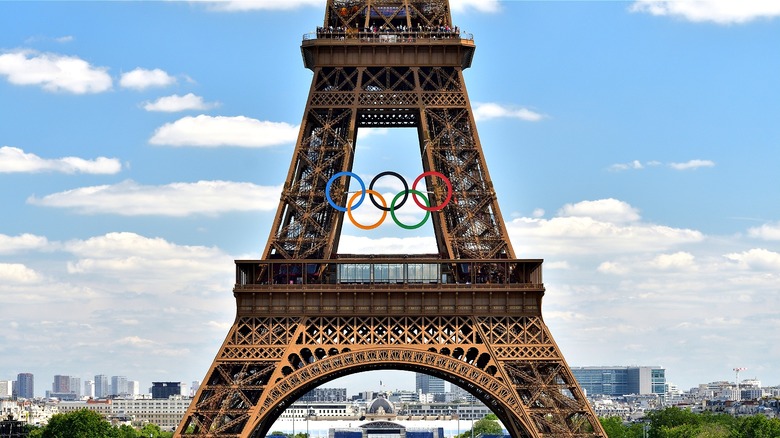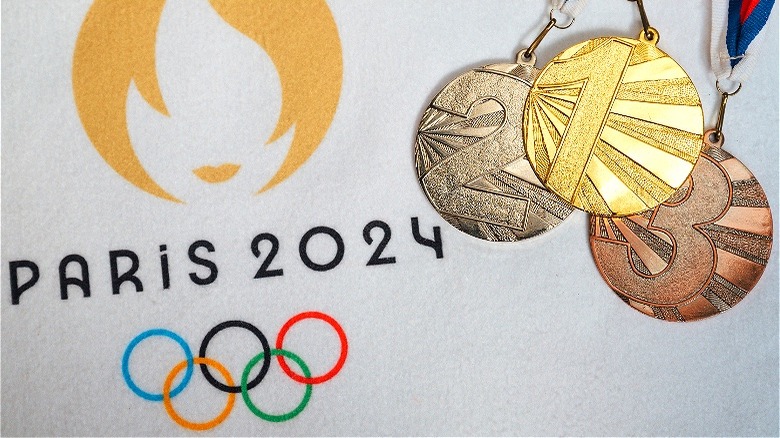Here's How Much Team USA Athletes Make For Winning Olympic Gold
With the Olympics in full swing, it seems like everyone's eyes are on Team USA. With a whopping 592 members of Team USA competing in Paris this year, chances are good that you've already seen a commercial, print ad, or even social media post about one or more athletes competing. While Team USA receives plenty of praise and support during the games, you might be wondering how, or even if, these athletes are actually paid for their talents. Between rigorous workout schedules, expensive equipment and/or training space, and specialized diets, it's not an easy, or inexpensive, feat to be an Olympic athlete going for the gold.
Olympic athletes aren't paid to compete, and they aren't directly paid by the International Olympic Committee (IOC) for winning either. However, this doesn't mean there aren't other ways for Olympic athletes to earn money for winning at the Games (to be clear, the potential for earning perks, money, and/or prizes is far less likely for athletes who fail to medal). Much the same way that NFL players rack up incredible incomes both on and off the field, Olympians can potentially earn money and/or prizes from various country-specific Olympic organizations and non-Olympic affiliated companies. This can include everything from their country's government to private corporate sponsors. While the possibility of lucrative arrangements like endorsement deals is generally limited to select high-profile athletes, many countries do offer their Olympians a wide range of potential perks and prizes.
What medal winners get
While the International Olympic Committee does not award Olympians with any monetary prizes, that doesn't mean other groups don't. Namely, the individual governments of the competing athletes can (and often do) award their athletes for medaling at the Games. For instance, the U.S. Olympic and Paralympic Committee pays athletes who medal (or place) in an event (competitors who fail to medal do not earn any awarded money). The U.S. committee pays athletes $37,500 for gold medals, $22,500 for silver, and $15,000 for a bronze. For comparison, winning athletes from Singapore are awarded roughly $737,000.
The Paris Games will also be the first time any international federation will award prize money to winning athletes. World Athletics announced it would be awarding $50,000 to track-and-field gold medal winners for all 48 track-and-field athletics events. Sebastian Coe, the organization's president, explained the decision to CNBC. "Athletes are, in essence, the bearers of the revenues that we get. Their performances at an Olympic Games, in our own World Championships, provide world athletics with broadcast revenue from the International Olympic Committee and at a world championship level," he said.
Coe argued it was about time athletes got a share of that revenue for themselves, going on to say, "It's just inconsistent for me, as president of World Athletics to talk about new fresh income streams and sponsors, [...] and not also recognize that the reason for that financial vibrancy is the performance of the athletes."
Other income and prizes
It is also worth mentioning private sponsors also often compensate Olympic athletes for winning gold, silver, or bronze. This can be anything from cash to property to prizes, and the prizes can be unusual, too. A particularly interesting example of just how offbeat a winning athlete's prizes could be happened during the 2020 Tokyo Games, when two Indonesian gold-medal-winning badminton athletes were each promised five cows, a meatball restaurant (offered directly by the meatball chain), and a new house, in addition to government-awarded prize money. With that said, for Team USA athletes, the prizes tend to be a little more straightforward.
Certain athletes may also receive sponsorship money from brand partnerships, advertisements, or even ambassador-type agreements. For instance, Forbes estimates that Simone Biles earns roughly $7 million in sponsorship deals across brands like Gap and Coca-Cola (meanwhile most of the NBA players representing Team USA's basketball team make massive salaries; here are the highest-paid NBA players, by the way). Athletes can also receive perks such as tax relief. Specifically, the 2016 United States Appreciation for Olympians and Paralympians Act allows prize winnings to be tax-exempt for Olympians making less than $1 million annually.
Other potential income and associated prizes for Olympic athletes include tuition grants and/or education funding, which can be beneficial for those who might want to pursue higher education. Another interesting reward for Olympians is the option to enroll in special health care plans. The U.S. Olympic and Paralympic Committee actually offers eligible Team USA athletes (and their dependents) fully paid-for health care packages that include access to not just medical care, but therapy and mental health services, too.


